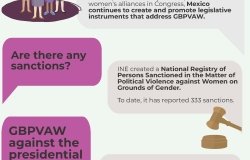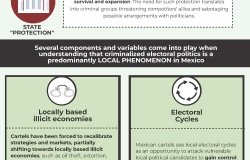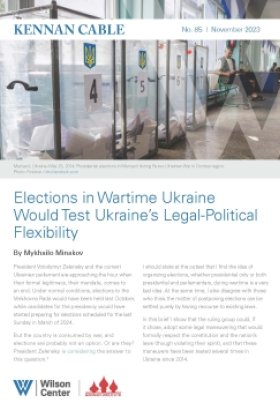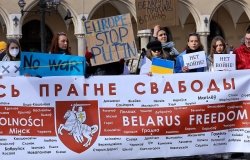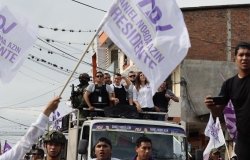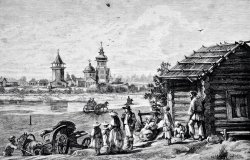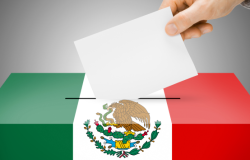Threats to the Free Press in the Baltic States: Assessing the Impact of Government Policies and the Financial Crisis
The 2008 economic crisis had a dramatic impact on the societies and economies of the Baltic States. To give a sense of the scale: in Latvia, GDP plummeted from 11.9 percent in 1996 to -19 percent in 2009. Two journalists from the region, Inga Springe and Dainius Radzevicius, asserted that among the many other consequences of the crisis, it has had a significant impact on the quality of the media. The panelists discussed the impact that these developments may have on democracy in the region.
Overview
The 2008 economic crisis had a dramatic impact on the societies and economies of the Baltic States. To give a sense of the scale: in Latvia, GDP plummeted from 11.9 percent in 1996 to -19 percent in 2009. Two journalists from the region, Inga Springe and Dainius Radzevicius, asserted that among the many other consequences of the crisis, it has had a significant impact on the quality of the media. The panelists discussed the impact that these developments may have on democracy in the region. After the crisis, funding for the media dropped substantially from both from private and public sources; large newspapers have changed hands; and investigative journalists' ranks have been diminished, as many have moved to more lucrative careers or have emigrated. "Journalists blogging their stories feel like volunteers and, for many, the profession has become just a hobby," Dainius Radzevicius said.
Inga Springe described the transformation of the largest internationally respected newspaper in Latvia, Diena, which she characterized as a "greenhouse" for journalists, since it was a perfect and sheltered environment in which to work, prior to the crisis. However, Diena underwent a radical transformation after ownership changed hands in 2009. Initially, the new owner of the newspaper was not clear, since the initial owner turned out to be a holding company based in Luxemburg. Several investigative journalists traced the paper trail to a Latvian Oligarch, with a questionable commitment to the free press. Springe raised questions about the editorial independence of the newspaper, especially after the format was changed, top journalists were laid-off and others' salaries were cut.
In some cases, journalists have been have been the targets of harassment as a direct result of their reports of government corruption. In one case, after revealing that electoral fraud was taking place during the mayoral elections in Jurmala, the prominent TV journalist Ilse Jaunalksne's phones were tapped by members of the government, and the transcripts were published in order to embarrass her. She took her case to court and won a settlement from the government, but only lower-level staff were punished. Afterwards, public funding for Jaunalksne's television show was reduced, prompting producers to move it from prime time to an early morning slot. Ultimately, Jaunalksne and her team moved their show to a private TV channel, raising questions about government backsliding on corruption, the decreasing independence of the media and self-censorship of journalists who avoid difficult stories in order to keep their jobs.
Radzevicius began his discussion on media in Lithuania by simply stating that among all objective observers, Lithuania is a free and democratic country. Nevertheless, the process of building an effective media, which manages the relationship between civil society and the government, is still an ongoing project. Debates continue about the development journalism as a profession and about how to differentiate news from advertising and entertainment.
With advertising cut by half in some markets after the crisis, media quickly changed its course, opting to sell papers with entertaining and sensationalist material and cutting investigative journalists' articles. In response to this shift away from serious news, the media has become a target of criticism by the public. Politicians have jumped on this bandwagon too, sometimes in ways that are self-serving: journalists complained vocally when Parliament restricted the number of press passes, and some politicians have threatened to cut funding for public media, after all, why should politicians fund journalists who only seem to work to criticize the government?
In both countries, there are new initiatives that indicate movement toward improving professional and ethical standards; improving journalists' training; and new incentives for journalists to pursue creative and high quality projects. The Lithuanian Journalists' Association has spearheaded an Action Plan that includes these goals, and a new initiative—the Baltic Center for Investigative Journalism—will strive to build connections between journalists across borders, so that they can share information and support their work.
Written by Nida Gelazis, Senior Associate, European Studies
Christian F. Ostermann, Director, European Studies
Speakers
Hosted By

Global Europe Program
The Global Europe Program is focused on Europe’s capabilities, and how it engages on critical global issues. We investigate European approaches to critical global issues. We examine Europe’s relations with Russia and Eurasia, China and the Indo-Pacific, the Middle East and Africa. Our initiatives include “Ukraine in Europe” – an examination of what it will take to make Ukraine’s European future a reality. But we also examine the role of NATO, the European Union and the OSCE, Europe’s energy security, transatlantic trade disputes, and challenges to democracy. The Global Europe Program’s staff, scholars-in-residence, and Global Fellows participate in seminars, policy study groups, and international conferences to provide analytical recommendations to policy makers and the media. Read more
Thank you for your interest in this event. Please send any feedback or questions to our Events staff.

